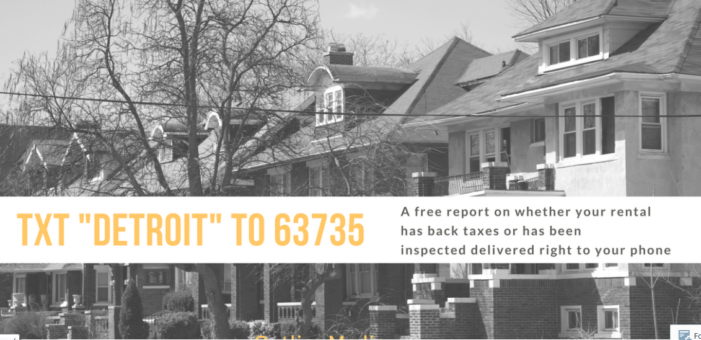Reporting on low-income communities is different than reporting for low-income communities. So says journalist and researcher Sarah Alvarez.
She points out the disconnect represents a huge problem – a large number of citizens are discounted as consumers of quality, relevant media.
Alvarez is the one-woman show behind Outlier Media, a project that aims to serve lower-income communities through an innovative reporting model.

Borne of research she conducted while studying at Stanford University, the effort funded in part by the W. K. Kellogg Foundation, reaches news consumers through their cell phones and via internet. Not as glamorous as an app or a push notification, Outlier buys blocks of cell phone numbers for potential media consumers, focusing on Detroiters, then texts them.
She focuses primarily on questionable financial practices, or what Alvarez terms “high-value information,” and shares information that can save people money, time, and hold someone accountable when faced with that issue.
“There’s an economist at Stanford who has done a lot of work on how the news has perpetuated information gaps by only covering things that (the wealthy) care about,” says Alvarez, “and mostly by covering them in a way that makes the news entertaining … I knew that I wanted to focus on those information gaps.”
Comprised of publicly available records, the information is sent when a user texts “DETROIT” to the number 63735. Some news and opinion pieces are also posted to outliermedia.org.
Alvarez began by looking at the biggest topics of consumer complaints, relying on data from the Consumer Financial Protection Bureau, United Way 2-1-1 information, and the Improve Detroit mobile app. Questions about housing, utilities, and city services were most common.
“What do you do when your landlord isn’t paying your utility bill?” asks Alvarez, citing examples. “What do you do when the place that was blighted next to you was on the demolition list and is no longer on the demolition list? These are all big public issues, and it’s not just (an affected consumer) who needs to know about these things.”
Many homeowners are unaware of how to get help with things like tax foreclosure, and many renters are unwitting victims of tax foreclosure when an absentee landlord doesn’t pay taxes. Outlier plans to help provide that information.
 Alvarez got the idea to help renters and low-income residents in part from looking at businesses that work in underserved areas, including payday lenders, companies that provide high-interest, short-term loans. Payday lenders have been criticized for predatory practices, balancing high default rates with sky-high interest rates, and have been subjected to increased scrutiny as the national consumer debt has ballooned in the United States and Canada.
Alvarez got the idea to help renters and low-income residents in part from looking at businesses that work in underserved areas, including payday lenders, companies that provide high-interest, short-term loans. Payday lenders have been criticized for predatory practices, balancing high default rates with sky-high interest rates, and have been subjected to increased scrutiny as the national consumer debt has ballooned in the United States and Canada.
Responses to Outlier’s promotion of public awareness have been promising, something Alvarez attributes to the value of serving a market too often ignored by the mainstream.
“People will trust you when you provide them high-value information,” she says.
Alvarez looks forward to hiring a journalist who’ll focus primarily on examining utility-related issues.
Utility service theft is also an issue that disproportionately affects certain Detroit neighborhoods. Alvarez says it’s not uncommon for low-income tenants moving into a new apartment to pay deposits of hundreds of dollars to secure service accounts.
Too much of the local media overlooks these issues, consigning a large segment of the community consumers to a kind of second-class status, she says. But Alvarez remains optimistic about efforts by groups like ProPublica, the Center for Investigative Reporting, the Knight Foundation, and the Kellogg Foundation.
Alvarez says a challenge she’s faced is skepticism about the work she is doing.
“‘But is that really ‘journalism?’ they’ll ask,” she says. “And I just say a simple, ‘Yes.’”
“It’s about using information for accountability. That’s the most basic view of journalism. It’s just the delivery system” that’s non-traditional.
“I want news organizations to see low-income consumers and to serve these folks as a market,” she says, “not see them as a charity case, not see them as something that it would be nice to (assign coverage), but as part of their job.”


